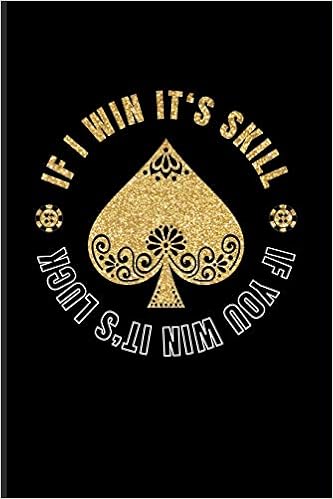Skill Vs Luck In Poker
- The Role Of Skill Versus Luck In Poker
- Skill Vs Luck In Poker Play
- Skill Vs Luck In Poker
- Skill Vs Luck In Poker Tournaments
Poker is 100% a game of skill in the long run. However there is a large element of luck in the short term. Professional poker players mitigate the luck aspect by consistently making mathematically superior decisions and therefore winning in the long run. In this article I am going to discuss how much luck plays a role in poker in the short run. The debate over whether winning depends on luck or skill is now spreading to other games. It may even determine the fate of the once lucrative American poker industry. Authorities shut down a number of major poker websites, bringing an end to the “poker boom” that had gripped the country for the previous few years.


In determining the legality of online poker - a multibillion dollar industry - courts have relied heavily on the issue of whether or not poker is a game of skill. Using newly available data, we analyze that question by examining the performance in the 2010 World Series of Poker of a group of poker players identified as being highly skilled prior to the start of the events. Those players identified a priori as being highly skilled achieved an average return on investment of over 30 percent, compared to a -15 percent for all other players. This large gap in returns is strong evidence in support of the idea that poker is a game of skill.
We would like to thank Carter Mundell for truly outstanding research assistance. The views expressed herein are those of the authors and do not necessarily reflect the views of the National Bureau of Economic Research.
Published Versions
“The Role of Skill Versus Luck in Poker Evidence from the World Series of Poker,” Journal of Sports Economics : 2012 (with Thomas J. Miles). DOI: 10.1177/15270 02512449471 citation courtesy of
Related
Topics
Programs
More from NBER
In addition to working papers, the NBER disseminates affiliates’ latest findings through a range of free periodicals — the NBER Reporter, the NBER Digest, the Bulletin on Retirement and Disability, and the Bulletin on Health — as well as online conference reports, video lectures, and interviews.

Most people today misunderstand poker. Letâ??s be frank: Most people know poker from the low-stakes games they now play (or grew up playing) with their family and friends. In these low-stakes home games, luck often plays a much bigger role than skill.
The Role Of Skill Versus Luck In Poker
The money to be gained or lost in a home tends to mean nothing, and everyone at the table plays almost every hand to the end. The dealerâ??s choice games are often nonstandard, even bizarre variations (often fun) where, for example, deuces, black kings or one-eyed jacks (or all of them) are wild. In this type of poker game, people just put their money in the middle (in the â??potâ?) and hope to make the best hand. Often, there doesnâ??t seem to be much strategy or thought involved.
Skill Vs Luck In Poker Play
One reason why luck has such a big role in the home-style poker games is that many of the skills we use in pro-style games just donâ??t come into play in a home game. For example, three of the more important skills we use are being patient in determining which starting hands to play, bluffing and reading people. Patience, like discipline, is a virtue in many areas of life, and poker is no exception. It is in the nature of professional or tough high-stakes poker games that it is mathematically correct to fold a lot of hands right away. If you are playing too many hands (which equates to too many bad hands) in a tough poker game, you will often find yourself â??drawing mighty thinâ? â?? that is, trying to win by catching particular cards that are in short supply.
The fact is that if you play too many hands in a pro-level poker game, you just cannot win â?? certainly not in the long run and probably not even on one given night, no matter how lucky you are. But if youâ??re playing a lot of hands in a home poker game, you may be in good shape anyway, because the sheer size of the pot will wind up offering you odds sufficient to draw to an inside straight (add a nine, for example, to your 7-8-10-J hand) or another â??unlikely to hitâ? hand. Youâ??ll usually lose, but when you do manage to hit the card you need, youâ??re going to win a huge pot.
Further, the number of cards that can complete what you need in the late rounds of a hand in a home game is often larger than one sees in the pro game, because the dealer has designated various wild cards or rules that allow you extra draws or give you chances to buy another card or replace a card.
Skill Vs Luck In Poker
Because you donâ??t see these big pots and people paying you off with weak hands in a pro poker game, patience is crucial there. In the traditional home-style poker games, patience is not as important but may actually clash with the â??spiritâ? of the game â?? â??Weâ??re all here just to have fun and gamble.â? Playing a more technically informed style may win you more money in a home game, but it might also mean that youâ??re not invited back the next time the game is held! In a casino poker game or an online poker game, you donâ??t need to be concerned that you might not be invited back.
Another key difference between home poker games and the games that the pros play is that bluffing actually succeeds in the pro-style games. In a home game, itâ??s extremely hard to pull off a bluff, because you usually canâ??t bet enough money on the last bet to get your opponents to fold. For 25 cents, someone who is convinced he is beaten is nonetheless willing to throw the two bits into the pot, just to see what you have, and there goes your attempted bluff. In fact, in most situations in these home games where there is a â??bet on the endâ? (in the last round of action in a given hand), someone is always egging someone else on to be the â??sheriffâ? â?? â??Bill, you call that boy and be the sheriff this hand! We canâ??t let him bluff us!â?
In the pro game, bluffing is a sound strategy, because in the late stages of a hand there arenâ??t many people who havenâ??t folded. If youâ??ve been playing very few hands (that is, patiently), and have seldom been caught bluffing during a day of play, then when you do bluff, itâ??s hard for those remaining in the hand to â??call you downâ? through the last bet. Bluffing well is an art form. The bluff is one of the poker craftsmanâ??s tools that is seldom available to players in wild, friendly, low-stakes games.
Another important element in pro poker games is reading your opponents. In a lot of home games, there is just so much money in the pot, relative to the size of the final bet, that it makes sense to call that bet. (What do you have to lose?) In pro poker, there is enough money involved, and enough actual thought processes are being utilized, that many situations come up where you can take advantage of a good read â?? which might arise either from your ability to detect weakness or strength in body language or from your ability to assess the implications of the betting pattern on the hand â?? and make either a good call or a good fold. But itâ??s hard to read someone who hasnâ??t really been thinking about the hand and canâ??t possibly be nervous about losing $1.75. The skill factor in poker is much higher in the pro game. There is just too much at stake for anyone to rely solely on luck.
Skill Vs Luck In Poker Tournaments

____________________________________________
By Phill Hellmuth, Jr.
Phil Hellmuth, Jr. is an 11-time World Series of Poker Champion leading all poker players in the world. His latest book, â??Deal Me In,â? is on the fast track to becoming another best-seller for Hellmuth. He has two existing New York best-seller books â?? â??Play Poker Like the Prosâ? and â??Bad Beats and Lucky Drawsâ? â?? both of which can be found at Amazon.com. Philâ??s books, clothing line, blog, tips and more can be found at PhilHellmuth.com. You can also chat and play with him at Ultimatebet.com and also learn about his cell phone poker game at HellmuthHoldem.com. This column is an excerpt from â??Phil Hellmuthâ??s Texas Holdâ??emâ?